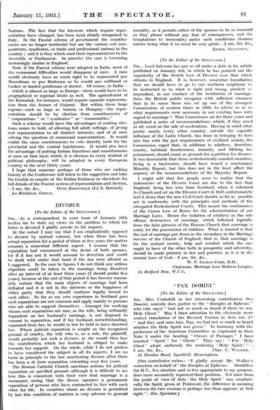DIVORCE
[To the Editor of the Seurr.vroa.]
Sin,—As a correspondent in your issue of January 10th
invites -Me to state my views on the problem to which his
. .
letter' is devoted I gladly accede to his request.
At the' outset. I may say. that I am emphatically opposed to divorce by . Mutual consent, but when there has been actual separation for a period of three or five years the matter asSuines. 'a somewhat different aspect. I assume that the separation had commenced 'at the desire of both 'spouses, for if it has not it would 'amount to desertion and could be dealt with under that head if the law were altered as I suggested. In the case he figures I do not think any serious objection Could be taken to the marriage being dissolved after an interval of at least three years (I should prefer five years), because at the end of that period it has become reason- ably certain that the main objects of marriage had been defeated and it is not in the interests or the happiness of either . party that they should continue legally bound to each other. So far as my own experience in Scotland goes such separations are not common and apply mainly to persons who are able to support themselves. - Amongst the working classes -such separations are rare, as the wife, being ordinarily dependent on her husband's earnings, is not disposed to consent to separation, and if her husband, notwithstanding, separated from her, he would in law be held to have deserted her. Where judicial separation is sought on the recognized ground of cruelty, the wife who is, as a rule, the plaintiff, would probably not - seek a divorce, as she would then lose the contribution which her husband is obliged to make towards her support. On the whole, while I do not profess to have considered the subject in all -its aspects, I see no harm in principle to the -law sanctioning divorce after there has been a de facto separation extending over five years.
The Roman Catholic Church sanctions actions for judicial separation on specified grounds although it is -difficult to see how this is consistent with their view that marriage is a sacrament, seeing that the decree operates a permanent separation of persons who have contracted to live with each other for life. In countries where -no divorce is permitted by law -this condition. of matters is- very adverse to general
morality, as it permits either of the spouses to be as immoral as they please' without any fear of consequences, and the temptations to immorality under such conditions (Hunan nature being what it is) must be very great.—I am, Sir, &c., .EDWD. SAIXESE.N.




































 Previous page
Previous page